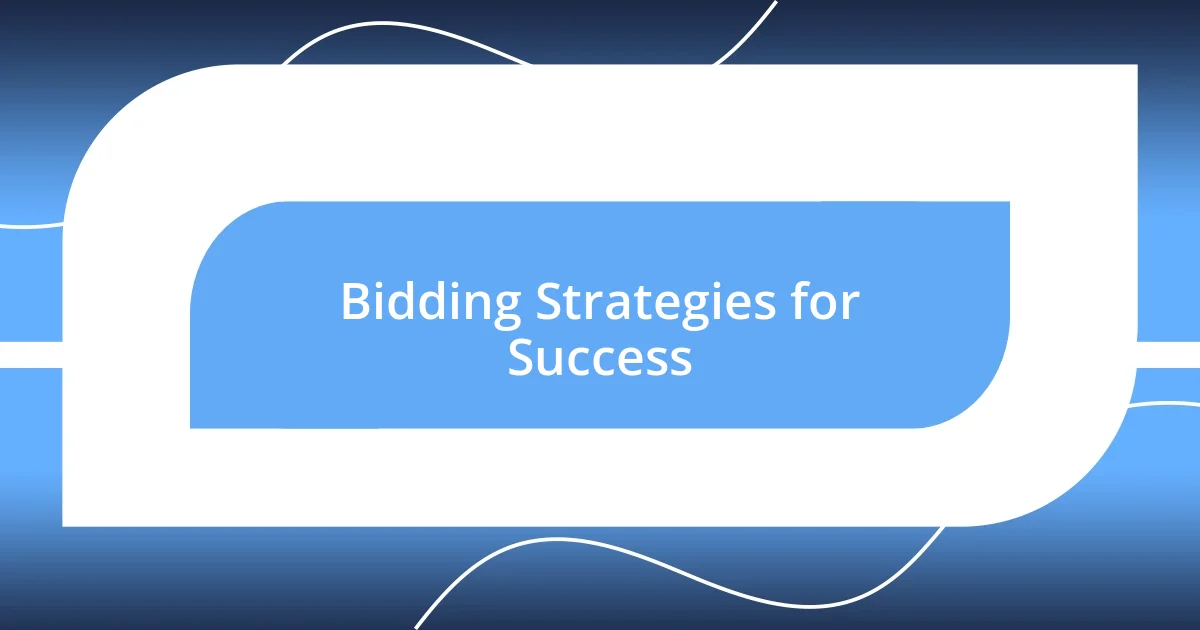Key takeaways:
- Understanding the mechanics and formats of commercial auctions is crucial for informed bidding and successful investments.
- Thorough research on properties, including location, condition, zoning, and market trends, is vital for making sound investment decisions.
- Establishing a budget, observing bidding behaviors, and engaging with auctioneers can enhance bidding strategies and outcomes.

Understanding Commercial Auctions
Commercial auctions can be a fascinating world to navigate. I remember attending my first auction feeling a mix of excitement and anxiety—there’s just something thrilling about the bidding process. The energy in the room can be palpable, and it’s easy to get swept up in the moment. Have you ever experienced that rush during a competitive auction? It’s a unique blend of strategy, adrenaline, and instinct.
Understanding the mechanics behind commercial auctions is crucial for anyone looking to dive in. These auctions often involve professional buyers and sellers, which can set a different tone compared to residential auctions. I learned quickly that doing your homework is essential; knowing the value of the assets being sold can make the difference between a smart investment and a costly mistake. In my experience, the more informed you are, the more confident you feel when placing bids.
As you explore commercial auctions, it’s vital to grasp the various formats, such as absolute, reserve, or minimum bid auctions. Each format can impact your bidding strategy significantly. When I first encountered an absolute auction, I was stunned by the idea that the highest bidder would win no matter what. It pushed me to reconsider my approach and focus on my financial limits, which ultimately led to more strategic bidding in subsequent auctions. It’s moments like these that truly deepen your understanding and appreciation of the auction process.

Key Benefits of Buying Commercial
One of the most compelling benefits I’ve discovered about buying commercial properties through auctions is the potential for significant savings. In my early days, I attended an auction where a prime property was sold for much less than its market value. It was exhilarating to witness how competitive bidding can sometimes lead to a steal! This experience taught me that with the right knowledge and preparation, one can achieve exceptional value—far more than what you’d usually find in traditional real estate purchases.
Here are some key benefits of buying commercial through auctions:
- Access to Unique Opportunities: Bidding on commercial properties can unlock access to assets typically not available through standard listings.
- Transparent Pricing: Auctions provide a clear and fair bidding process, helping buyers gauge the true market interest and value of the property.
- Potential for Quick Transactions: Unlike typical real estate deals, auction purchases often conclude in a matter of days, speeding up the investment process.
- Variety of Properties: Auctions can feature a wide range of commercial properties, from retail spaces to warehouses, catering to diverse investment strategies.
- Competitive Environment: The auction atmosphere fosters seriousness among bidders, often driving prices to reflect genuine market demand.
In my journey, I’ve learned that these benefits can significantly impact both emerging investors and seasoned pros, fueling a dynamic and rewarding investment experience in commercial real estate.

Researching Auctioned Properties
The process of researching auctioned properties is a crucial step that I can’t stress enough. Diving into background information can be thrilling, almost like a treasure hunt. On one occasion, I stumbled across a property that piqued my interest. The more I dug into its history, from previous ownership to any zoning issues, the clearer the picture became. It taught me that knowledge, especially about the property’s potential and pitfalls, can be a game-changer.
When I conduct research for auctioned properties, I usually gather data from multiple sources. This includes online databases, local government records, and neighborhood trends. Each piece of information is like a puzzle piece that contributes to the bigger picture. For instance, I once overlooked an area’s recent infrastructure developments that hinted at future growth, which could have influenced my bidding strategy. The importance of comprehensive research can’t be understated; it’s a key determinant of how successful your auction experience can be.
To keep things organized and focused during my research process, I often use spreadsheets or comparison tables to evaluate properties side by side. This technique not only helps in analyzing them but also simplifies the decision-making process under pressure. Have you ever felt overwhelmed by choices? It’s normal! My approach is to break it down into manageable parts. Below is a simple comparison table format to illustrate the research elements I find useful.
| Property Feature | Research Considerations |
|---|---|
| Location | Check access to amenities, traffic patterns, and future developments. |
| Condition | Evaluate the property’s physical state through inspections and repair costs. |
| Zoning | Understand zoning laws that dictate what businesses can operate there. |
| Market Trends | Monitor local real estate trends and property values over time. |
| Past Sales | Look at previous sale prices to gauge current market value. |

Bidding Strategies for Success
When it comes to bidding strategies, one of my most effective tactics has been setting a budget before I even step foot into the auction. I vividly remember a time when excitement made me lose sight of my limits, and I ended up bidding more than I intended on a property that felt like a dream. Trust me, walking away without that property felt a lot better than regretting a financial overreach! Establishing clear boundaries keeps your focus sharp and helps you avoid that racing heart moment at the auction podium.
I find it beneficial to watch the flow of bidding early on. There’s a rhythm to it, like a dance. I once stood back during the initial bids at an auction, observing how several bidders interacted, which gave me valuable insight into their strategies. Was someone particularly aggressive? Did others seem reluctant? This understanding helped me formulate a counter-strategy that ultimately landed me a property at a fraction of the anticipated price. Have you tried this approach? It might surprise you how much you can learn just by watching.
Engaging with the auctioneer can also be a game-changer. I discovered this firsthand during a particularly tense auction. By asking strategic questions about the auction process and the property itself, I not only gleaned critical information but also established rapport with the auctioneer. It’s surprising how a little conversation can open doors—sometimes I felt like I was getting insider tips! So, don’t hesitate to voice your curiosity; it could provide you with an edge that enhances your bidding strategy significantly.

Common Mistakes to Avoid
One of the biggest missteps I see bidders make is failing to read the auction terms thoroughly. I once jumped into an auction thinking I understood everything, only to realize later that there were hidden fees I hadn’t anticipated. Have you ever felt that sinking feeling? It’s a harsh wake-up call when the thrill of the auction blinds you to the fine print. Knowing what you’re signing up for can save you from unpleasant surprises down the road.
Another common mistake is getting emotionally attached to a property. I remember when I fell head over heels for a commercial space. My heart was set on it, but my finances weren’t aligned. It became a battle between desire and logic—a struggle I lost. Letting emotions cloud your judgment can lead to regrettable decisions, so it’s essential to keep a level head and stick to your pre-determined goals.
Lastly, underestimating the competition can truly be a rookie error. I once assumed that the presence of other bidders would be minimal due to the property’s condition. How wrong I was! That auction turned into a fierce battle as experienced bidders caught me off guard. I learned the hard way that every auction has its surprises, and every property can attract attention. Always prepare for the possibility of stiff competition, and you will be better equipped to handle it.

Post-Auction Considerations
After the auction, it’s crucial to review the final results, especially if you came out as a winner. I remember the adrenaline rush of winning a bid on a prime piece of real estate. It felt incredible at first, but then reality set in—I had to assess the additional financial obligations like taxes and renovation costs. Have you ever felt that overwhelming mix of excitement and anxiety right after a big win? Analyzing the total investment is essential to avoid any nasty surprises later on.
Another essential post-auction consideration is following up on all necessary paperwork. I once neglected this step, thinking everything was straightforward, but I found myself scrambling to gather documents when it was time to close. The whole experience taught me that diligence is key; missing paperwork can lead to delays or even complications in ownership transfer. Always double-check that everything is in order!
Lastly, it’s a good idea to reflect on your bidding experience as a whole. I often take time to ponder what strategies worked for me and what didn’t. Was my approach effective? Did I stick to my budget, or did I let emotions sway my decisions? This self-reflection not only sharpens my skills for future auctions but also enhances my overall confidence in the bidding process. Have you tried keeping a bidding journal? It’s an insightful way to track your progress and growth in the auction arena.

Using Auctions for Investment Growth
Using auctions for investment growth can be incredibly rewarding, but understanding how to leverage these opportunities is key. I remember attending my first commercial auction, wide-eyed and enthusiastic, after having researched various properties to bid on. It hit me that timing is everything; securing a great deal hinged on knowing when properties would reach their peak interest. Have you ever felt that rush of momentum when the auctioneer’s gavel fell? In that moment, I realized how important it was to act decisively while remaining calm.
Another essential lesson I learned is that auctions can be a fantastic way to discover undervalued assets. Once, I stumbled upon a property that I was initially unsure about—it seemed to fly under the radar. However, after weighing its potential and doing my homework, I was able to acquire it at a fraction of its market value. I sometimes think about those hidden gems; have you ever found a deal that made you wonder how it was still available? Investing in a property that others overlook is a strategy that can lead to significant growth, but it requires a keen eye and a thorough understanding of the market.
Finally, it’s crucial to cultivate relationships within the auction community. When I started interacting more with seasoned bidders and auctioneers, I found that their insights were invaluable. I once learned about an upcoming auction for a property that wasn’t even on my radar because I had built that rapport. These connections can provide a competitive edge when every bit of information counts. Building a network around you not only enhances your learning but can also lead to better investment opportunities. Have you considered reaching out to others in the auction space? Those conversations can unlock pathways to growth you never knew existed.














